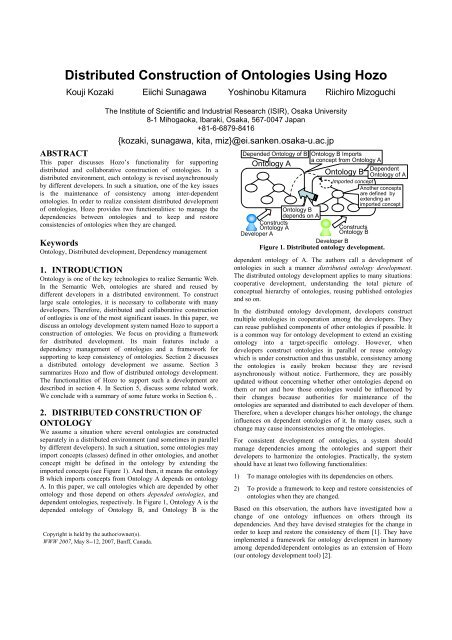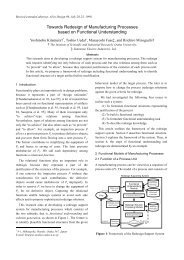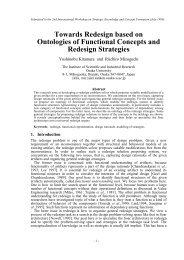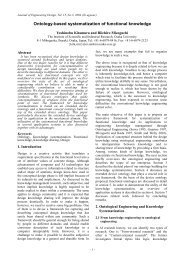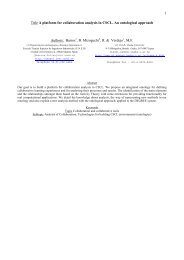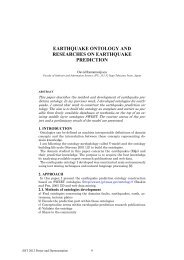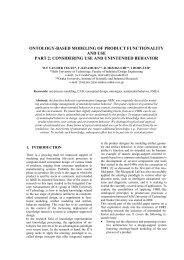Distributed Construction of Ontologies Using Hozo - CiteSeerX
Distributed Construction of Ontologies Using Hozo - CiteSeerX
Distributed Construction of Ontologies Using Hozo - CiteSeerX
Create successful ePaper yourself
Turn your PDF publications into a flip-book with our unique Google optimized e-Paper software.
Ontology/ModelDeveloperbrowsing(modifying)buildingTrackingPaneOntologyEditorsupportOnto Studio(a guide system forontology design)Information<strong>of</strong> changesLanguageManagement SystemOntologyManagerOntology ServerOntologyModelDependencyManagementFigure 2. Architecture <strong>of</strong> <strong>Hozo</strong>Clients(other agents)3. HOZO3.1 Overview <strong>of</strong> <strong>Hozo</strong>We have developed an environment for building/using ontologies,named <strong>Hozo</strong>, based on both <strong>of</strong> a fundamental consideration <strong>of</strong> anontological theory and a methodology <strong>of</strong> building an ontology.The features <strong>of</strong> <strong>Hozo</strong> include 1) Supporting role representation [3,4], 2) Visualization <strong>of</strong> ontologies in a well considered format, and3) <strong>Distributed</strong> development based on management <strong>of</strong>dependencies between ontologies. <strong>Hozo</strong> is composed <strong>of</strong> OntologyEditor, Onto-Studio (a guide system for ontology design),Ontology Server and Ontology Manager (see Figure 2). Theontology editor provides a developer with a graphical interface,through which they can browse and modify an ontology locally.The ontology server stores and manages ontologies under accesscontrol and version management. The developer can access andbrowse them through the ontology manager. Furthermore, theontology editor <strong>of</strong> <strong>Hozo</strong> provides a user support module tomaintain consistencies <strong>of</strong> the dependencies among ontologies,called Tracking Pane. <strong>Hozo</strong>’s native language is XML-basedframe language and ontologies can be exported in OWL, andRDF(S). It does not support native OWL, but it can import OWLpartially 1 . The latest version <strong>of</strong> <strong>Hozo</strong> is published at the URL:http://www.hozo.jp.3.2 Flow <strong>of</strong> <strong>Distributed</strong> Ontology DevelopmentFigure 3 shows a skeleton <strong>of</strong> our conceptual framework fordistributed ontology development. It consists <strong>of</strong> two parts in aserver-client architecture. One is a shared space, where developersstore ontologies to be opened to other developers. The other is alocal space, where each developer builds and modifies eachontology which he is responsible for. The developers cannot editthe ontologies stored in the shared space directly. Under accesscontrol and version management, they edit the personal copies <strong>of</strong>ontologies locally and upload them to the shared space whennecessary.In the distributed ontology development, a target ontology can beregarded as a system <strong>of</strong> interrelated ontologies stored in the sharedspace. They are constructed in cooperation among the developers.Each developer constructs some <strong>of</strong> them under his responsibility 2 .Then, he may refer to other ontologies and import concepts1 The OWL import mechanism is under improvement.2 A same component ontology may be constructed by severaldevelopers.Reference / InstallShared Space(server system)UploadDownloadVersion ManagementAccess ControlUploadModificationEditingDeveloper DeveloperDownloadModificationEditingUploadOntology whichthe developer buildsOntology whichthe developer refers toPersonal Space(client system)ModificationEditingDeveloperFigure 3. A Conceptual Framework for <strong>Distributed</strong>Ontology Development.defined in them. It implies that each developer has two kinds <strong>of</strong>ontologies: ontologies which the developer builds and ontologieswhich he/she refers to.<strong>Distributed</strong> ontology development proceeds in the repetition <strong>of</strong> thefollowing steps;1) A developer gets latest information on ontologies which hebuilds or refers to from the ontology server. And hedownloads them form shared space to personal space (client)through an ontology manager. If it is needed, he locksontologies to avoid that someone updates those ontologieswhile he is editing them.2) The developer analyzes changes in the updated ontologiesand evaluate whether the changes are influencing onconsistency <strong>of</strong> the ontology which he is constructing with thehelp <strong>of</strong> ontology manager.3) If the changes cause inconsistency in his ontology, thedeveloper modifies his ontology in order to keep and restoreits consistency with the updated ontologies. <strong>Hozo</strong> helps thismodification process by suggesting possible countermeasuresfor coping with each <strong>of</strong> the changes.4) After the modification, the developer starts editing hisontology as he needs. While editing the ontology, he canimports and use concepts from other ontologies which herefers to. Then the dependency between his ontology and thereferred ontology through the imported concepts is managedby the ontology manager.5) After editing, the developer publishes his ontology byuploading it to the shared space. And then, he unlocks theontology if he allows other developers to edit it.Every developer goes over this process individually and in parallel,and then the whole target ontology evolves. As a result <strong>of</strong> theirdeveloping processes the whole target ontology is constructed inthe shared space.We suppose another collaborative development process such asconstructing a single ontology by many developers. Ourdistributed ontology development also can support such process inthe repetition <strong>of</strong> the following steps:1) The developers share a target single ontology in the sharedspace. The ontology server manages versions <strong>of</strong> the ontologyand accesses to it.2) When a developer edits the target ontology, he locks theontology and downloads it to his personal space.
Depended ontologyDetails <strong>of</strong>ModificationChanged conceptsandits type <strong>of</strong> changeLegendsDeletedModifiedAddedDepended ontologyConceptswhich the changeinfluencesLegendsDeletedModifiedAddedSelected ConceptFigure 6. Tracking Pane.modified one. And, if the change type is deletion <strong>of</strong> importedconcept, the acceptance corresponds to deletion <strong>of</strong> the concept.The developer can apply these countermeasures by selecting itthrough a pop up menu on the browsing pane. After applyingcountermeasures, he edits his ontology for coping with the changeif necessary. In that case, it is helpful to him that the system showsthe concepts influenced by the change. Furthermore, if he needsadvanced strategies, the system shows him all countermeasures 6with their details on a harmonizing pane.5. Related WorksPromptDiff includes a version-comparison algorithm and enablesusers to view the differences between the versions [5]. It takessame approach with us, but it does not support distributeddevelopment discussed section 2. DILIGENT [6] and ONKI [7]supports distributed development <strong>of</strong> ontology through sharedspace for ontologies in the same way with <strong>Hozo</strong>. But they do nothave functionalities to suggest countermeasures for coping witheach <strong>of</strong> the changes to the developer when depended ontologiesare modified. KAON and ours focus on that changes in oneontology can cause inconsistencies in other dependent ontologies.And, in order to ensure their consistencies, they propose derivingevolution strategies [8]. But it does not provides strategies whichreduce the influences against the changes although <strong>Hozo</strong> suggeststhem (e.g. deletion <strong>of</strong> a concept can be canceled by redefining it inanother ontology). The difference is caused by different treatment<strong>of</strong> relationship between depended ontologies and dependentontologies.6. CONCLUSION AND FUTURE WORKIn this paper, the authors discussed some functionalities <strong>of</strong> <strong>Hozo</strong>to support distributed ontology construction. Harmonization <strong>of</strong>ontology is an essential issue especially in a distributeddevelopment. Our system contributes to resolving the issue basedon management <strong>of</strong> dependencies between ontologies. Thefunctionalities can support to construct a single ontology by manydevelopers collaboratively.As future work, the authors plan to enhance our system accordingto the following future plan: (1) Maintenance <strong>of</strong> consistency6 We have not implemented some <strong>of</strong> advanced countermeasuresyet. But, we suppose the two major strategies are enough forcoping with the change in a lot <strong>of</strong> cases.Concepts which the change<strong>of</strong> selected concepts influencesFigure 7. Representation <strong>of</strong> changes on Browsing Pane.among ontologies and its instance models based on our framework.(2) Supporting native OWL without transformation <strong>of</strong> file format.(3) Functionality to deal with OWL imports which refer to OWLfiles that are kept elsewhere. (4) Functionality for checking theontology with a reasoner.7. ACKNOWLEDGMENTSWe are grateful to Mr. Mamoru Ohta for his support to implementour system.8. REFERENCES[1] E. Sunagawa, et al.: An Environment for <strong>Distributed</strong>Ontology Development Based on Dependency Management,Proc. <strong>of</strong> ISWC2003, pp. 453-468, 2003.[2] Kozaki K., et al.: <strong>Hozo</strong>: An Environment for Building/<strong>Using</strong><strong>Ontologies</strong> Based on a Fundamental Consideration <strong>of</strong> "Role"and "Relationship", Proc. <strong>of</strong> EKAW2002, pp.213-218,Siguenza, Spain, 2002[3] Sunagawa, E., et al. :Organizing Role-concepts in OntologyDevelopment Environment: <strong>Hozo</strong>, Proc. <strong>of</strong> 2005 AAAI FallSymposium on Roles, an interdisciplinary perspective, 2005[4] Kozaki K., et al.: Fundamental Consideration <strong>of</strong> RoleConcepts for Ontology Evaluation, Proc. <strong>of</strong> EON2006Edinburgh, United Kingdom, May 22, 2006[5] Noy, N., et al.: Tracking Changes during Ontology Evolution,Proc. <strong>of</strong> ISWC2004, Hiroshima, Japan, pp.259-273, 2004[6] Tempich, C., et al.: An Argumentation Ontology forDIstributed, Loosely-controlled and evolvInG Engineeringprocesses <strong>of</strong> oNTologies (DILIGENT), Proc. <strong>of</strong> ESWC2005,Greece, pp. 241-256, 2005[7] Valo, A., Hyvonen, E. and Komurainen, V.: A Tool forCollaborative Ontology Development for the Semantic Web,in: Proc. <strong>of</strong> DC 2005, Madrid, Spain, 2005.[8] Stojanovic, L., Maedche, A., Motik, B. and Stojanovic, N.,User-driven Ontology Evolution Management, Proc. <strong>of</strong>EKAW 2002, Madrid, Spain, pp. 285-300, 2002


